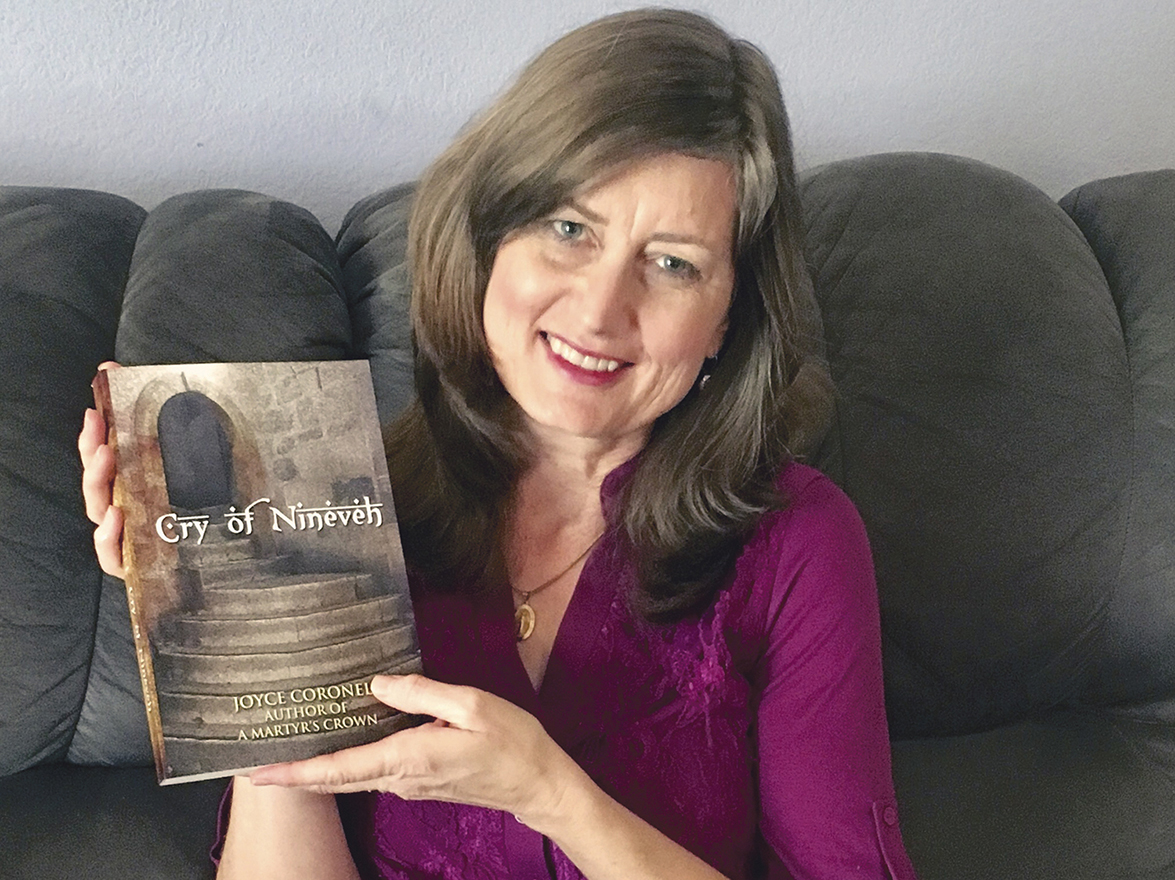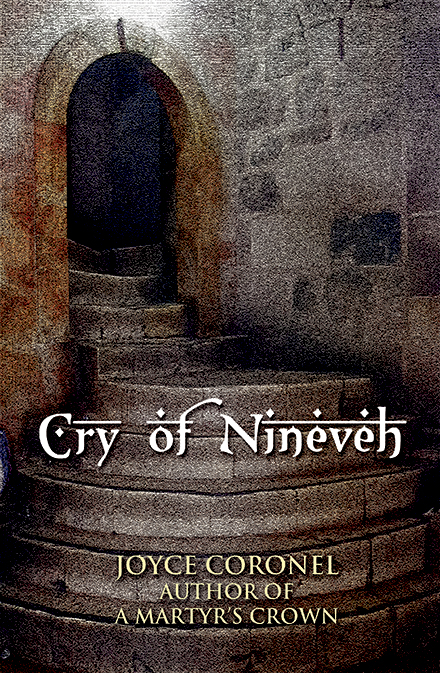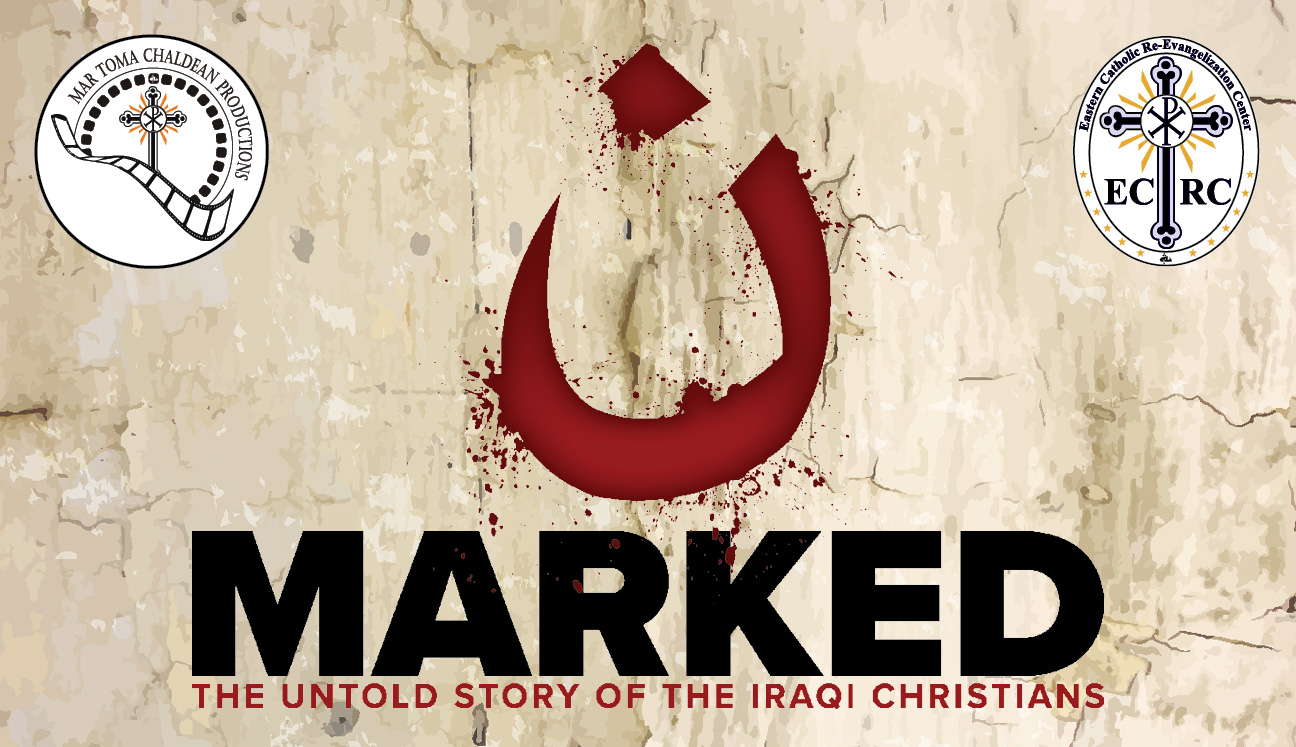

‘Cry of Nineveh’
Author: Joyce Coronel
Publisher: Holy Angels Press
Length: 330 Pages
Release Date: Oct. 19, 2016
Click here to order a copy.
Book signings
Following Holy Hour for Persecuted Church
6:30 p.m., Nov. 15
Ss. Simon and Jude Cathedral, 6351 N. 27th Ave.
Click here for more information.Following screening of the documentary ‘Marked’
7 p.m., Nov. 18
St. Mary’s High School, 2525 N. Third St.
Click here to learn more about ‘Marked.’
Tickets are free, but pre-registration is required. Click here to RSVP.Info for both events: (480) 239 6768
Joyce Coronel has never been to Iraq or Syria, but you couldn’t tell by reading her latest book, “Cry of Nineveh.” Coronel, a longtime reporter for The Catholic Sun, just published her second novel based on the persecution of Christians in the Middle East.
Though not directly a sequel to her previous novel, “A Martyr’s Crown,” “Cry of Nineveh” has many of the same characters and settings, though Coronel says both books can stand alone.
“I’d written a number of articles on this topic. What happens is that information is something that people read and consider and then they move on to the next bit of information. The difference with a novel is that it has the ability to really evangelize,” said Coronel, who has developed passion for covering the Eastern Rite beat. “I want for my book to touch people’s hearts and not just to maybe bring a tear to their eyes, but to call them to do something, to grow in their own faith, but then to reach out and actually do something.”
That’s why at the back of her book she’s included resources for different organizations to help readers make a difference.
“You have tens of thousands of people living in northern Iraq who were chased from their home two and a half years ago now, and they’re forgotten,” she said. “They’re telling us, ‘Don’t forget us.’ Those people are dying from stress and from illnesses that are entirely treatable. People without a home, they’ve lost everything rather than convert.”
Even though “Cry of Nineveh” is a work of fiction, much of the dialogue in her book is taken from actual interviews.
“Almost everything in that book, those are quotes that I’ve gotten from people that have told me their stories through the years,” said Coronel. “I’ve talked to people who’ve been shot for their faith, people who’ve been run out of their villages, run out of their homes, priests, nuns, laypeople. They’re very stark images and so is the book.
“It’s a tough read because these are real life accounts of what actually happened to people — the torture, the violence, the threats of persecution, the betrayals, all of it. Those are real people’s voices that I’ve fit into this novel that I’m hoping will really move people’s hearts and call them to do something.”
Maha George, who attends Holy Cross Chaldean Mission in Gilbert and moved to the U.S. from Iraq 19 years ago, served as the inspiration for one of the characters whose brother is kidnapped in “Cry of Nineveh.”
“When I was reading this book, I was crying the whole time. You leave there and try to forget. This book took me back to all that happened,” said George.
She recalled her brother being kidnapped and tortured physically and psychologically. When her family was able to pay the ransom, “by God’s will they released him,” but they defecated in his hat and put it on his head before throwing him into the street.
George herself was shot while she was in her last month of pregnancy. The bullet passed through her hand and thigh, but fortunately didn’t penetrate her belly, and her son was unharmed. That moment is when they left the country, leaving everything behind.
“All the history and churches are being destroyed, churches that have been there for thousands of years,” she said.
The book also focuses on a veteran and addresses the psychological impact combat can have on soldiers. As the soldier confronts his past, he learns to leave his burdens at the foot of the cross.
“There’s a confession scene in the book that Bishop [Thomas J.] Olmsted advised me on — I thought that was important,” said Coronel. “The beauty of confession is a message in this book.”
Coronel said “Cry of Nineveh” focuses on the faith of martyrs and challenges the “comfortable Catholicism” that many may have in the U.S.
“I can see for myself I had never risked anything for our faith, and faith in that kind of environment can become just a safe thing, a comfortable thing — a nice idea, but the thought of actually sacrificing and suffering rather than turning your back on Jesus, that’s just foreign to us,” she said.
“This era of martyrdom, it’s not long ago. It’s happening today, it’s happening now and we are standing here today because of the faith of martyrs. Our Church is built on the shoulders of Apostles and martyrs and confessors, and this gift that we have from the Eastern Church is a real reminder to us of the sacrifices that have been made, all for the name of Jesus Christ.”







